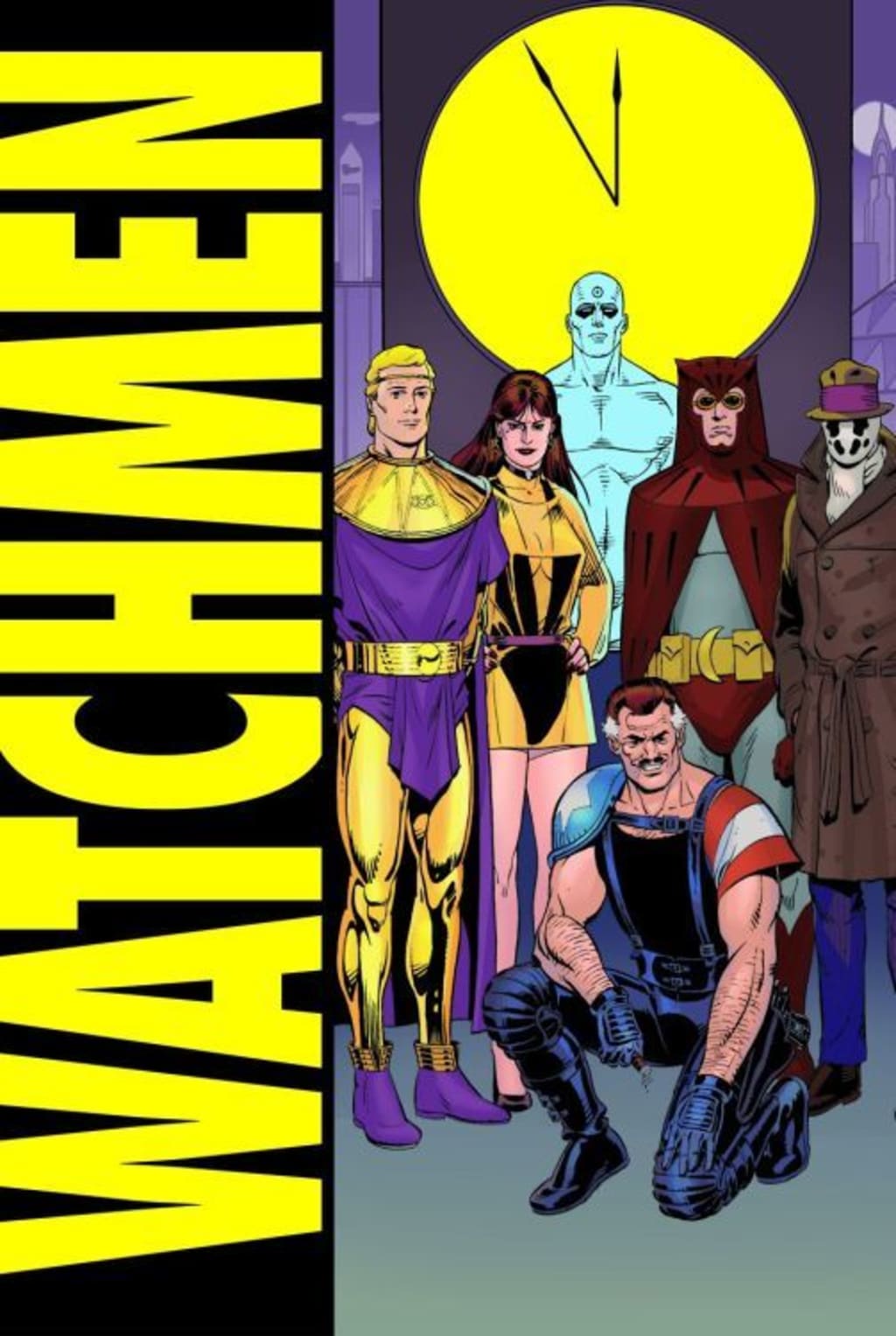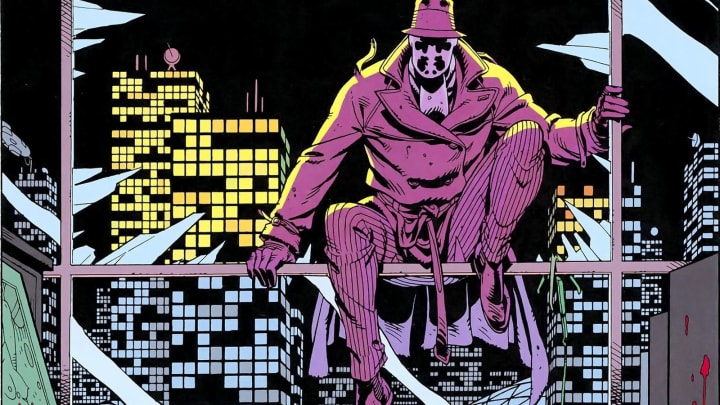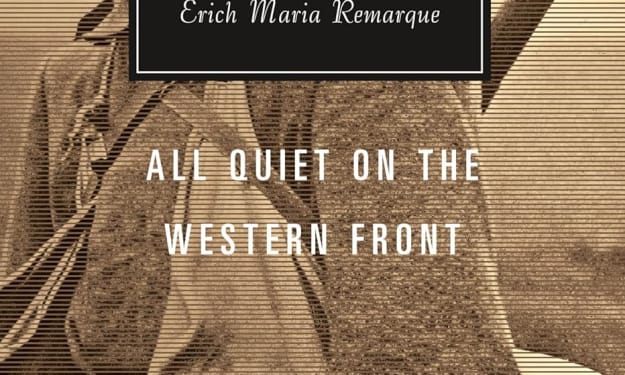'Watchmen:' A Review
A Grim Story in a World Where Not Everything Has a Happy Ending

Before I begin, I'll offer a fair warning that this review may contain story spoilers, and is about the graphic novel only, not the movie. The Watchmen story written by Alan Moore, with art by Dave Gibbons and colorist John Higgins was, up until recently, the most well-known graphic novel I knew virtually nothing about. In fact, that I knew up to that point was only really what I had drawn from the movie adaptation by Zack Snyder, the director's cut which amounted to something three hours long and sometimes confusing.
Leading up to the point of my getting Watchmen, my only dealings with comics/graphic novels up to that point were restricted to the main canon of both the Marvel and DC comics universes. A big fan of Batman, and a full-on Marvel fanboy, I suppose I expected Watchmen to be along the same lines as most other comic books; but God was I wrong.

Doctor Manhattan is probably the most well-known of the Watchmen characters even among those comic book fans who have never gone near the series. This might be because he's big and blue, or it might be because he's naked a lot, but one thing that stands out about this enigmatic character is that he is both all-powerful and all-knowing, yet barely knows anything at all when it comes to understanding humanity. It's referenced a couple of times that Jon (Doc Manhattan), seems to be losing his memory of what he once was, and is losing all understanding of what it means to be human. In fact, there's another long conversation that spans the majority of an issue where he is debating the necessity to save humanity from impending doom in light of the potential all-out nuclear war between America and Russia. To paraphrase an argument made by Manhattan, the universe wouldn't notice the extinction of humanity, so why should he intervene in something so insignificant among the grand scheme of things?
This type of thinking and debate runs through the entirety of the book, a cynicism and darkness to the story that will likely put off some casual readers, but is no doubt the reason behind such universal praise of the story. The question of the darkness and futility of humanity is clear in all the characters as they wrestle with their current status quo, as vigilantism is now completely outlawed and the only active superheroes are those sanctioned by the government.

Rorschach, a hero so named after the changing mask he wears over his head, or his "face" as he calls it, is symbolic again of the damage within people, and how they deal with that damage and how it paints their view of the world. Rorschach is a victim of a cruel and abusive childhood, raised to view himself as ugly, he covers his face with a mask. He starts off like any hero, simply wanting to do good, bring justice to the world, until he stumbles upon a crime so horrific it tips him over the edge. He's no longer interested in simply having these criminals arrested, he now doesn't hesitate to treat them as brutally as they may treat their victims. As he's investigating the murder of another former superhero, Edward Blake (The Comedian), his paranoia about a "Mask killer" reverberates through his friends and through the city itself. The average passerby is growing increasingly anxious at the growing Cold War tensions, these increasing at the same pace of the paranoia of Rorschach, and the progress through his investigations.
The Movie Version, Duh

For me, maybe the most uninteresting of the characters within Watchmen were Nite Owl and Silk Spectre. Spectre, the former girlfriend of Dr. Manhattan, has fallen into the arms of her former teammate, Nite Owl, who's now retired and nostalgic for the good-old crime-fighting days. They don't really seem to have the same paranoia and worries surrounding their current global situation. More dragged into the "Mask killer" investigation against their will, their arc is one that we've seen in pretty much all forms of media at least one time or another. This isn't to say its not without its charm, but it's clear where the main focus of the story lies, and where the true care and attention to detail sits in this entire story arc.
Bringing the entire story together, it's made clear toward the final few issues who the main villain is, and just how truly out of their depth our heroes are. However, it doesn't end with a smile and a handshake as our heroes have vanquished the evil villain, in fact, it's suggested that perhaps the villain was right all along. This heinous act needed to be committed so that world peace could be made real, and everyone could live in harmony. Sacrificing the few in favour of the many, the ethical 'trolley problem' debate, is one that's been had for decades, and while the story leans very heavily in favour of the idea of saving the many by sacrificing the few, the final page of the book leaves it open to the reader's own interpretation on the rights and wrongs of it all.
Sure, world peace may have been achieved for now, but at what cost, and for how long? The cynicism about humanity that's presented through the entire book may give you pause for thought that they'll find a way to screw it up eventually. On the flip-side, it may encourage you to think that humanity can be redeemed, and simply needs that "shock" to the system to truly bring it together. There's a big difference between the end of the film and the end of the book in just how this is brought about, but the overarching principle is the same. Give humanity a common enemy or goal, and this is what will bring them together; essentially, for humanity to thrive, it needs clear direction.
Easily the best graphic novel I've ever read, and I found myself truly blown away by the ending that actually gave me pause for thought. A remarkable literary work that encourages you to face hard truths about humanity and our place in the universe, as well as the darkness that exists around and within.
Rating: 10/10
About the Creator
The One True Geekology
"Strange women lying in ponds distributing swords is no basis for a system of government." - Dennis the Peasant
Come find us at itsgeekology.com/collective and www.facebook.com/itsgeekology/
Enjoyed the story? Support the Creator.
Subscribe for free to receive all their stories in your feed. You could also pledge your support or give them a one-off tip, letting them know you appreciate their work.






Comments
There are no comments for this story
Be the first to respond and start the conversation.